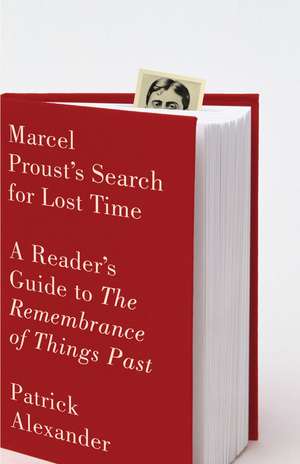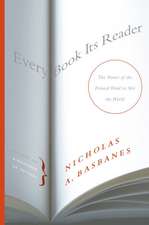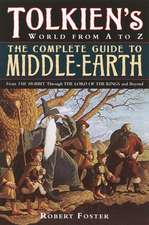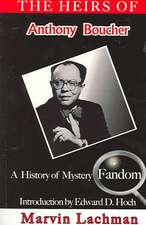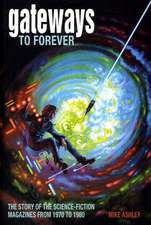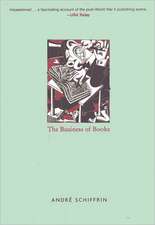Marcel Proust's Search for Lost Time: A Reader's Guide to Remembrance of Things Past
Autor Patrick Alexanderen Limba Engleză Paperback – 31 aug 2009
At seven volumes, three thousand pages, and more than four hundred characters, as well as a towering reputation as a literary classic, Proust’s novel can seem daunting. But though begun a century ago, in 1909, it is in fact as engaging and relevant to our times as ever. Patrick Alexander is passionate about Proust’s genius and appeal—he calls the work “outrageously bawdy and extremely funny”—and in his guide he makes it more accessible to the general reader through detailed plot summaries, historical and cultural background, a guide to the fifty most important characters, maps, family trees, illustrations, and a brief biography of Proust. Essential for readers and book groups currently reading Proust and who want help keeping track of the huge cast and intricate plot, this Reader’s Guide is also a wonderful introduction for students and new readers and a memory-refresher for long-time fans.
Preț: 80.14 lei
Preț vechi: 95.38 lei
-16% Nou
Puncte Express: 120
Preț estimativ în valută:
15.34€ • 15.95$ • 12.66£
15.34€ • 15.95$ • 12.66£
Carte disponibilă
Livrare economică 25 martie-01 aprilie
Preluare comenzi: 021 569.72.76
Specificații
ISBN-13: 9780307472328
ISBN-10: 0307472329
Pagini: 385
Ilustrații: THROUGHOUT
Dimensiuni: 134 x 202 x 20 mm
Greutate: 0.34 kg
Editura: Vintage Books USA
ISBN-10: 0307472329
Pagini: 385
Ilustrații: THROUGHOUT
Dimensiuni: 134 x 202 x 20 mm
Greutate: 0.34 kg
Editura: Vintage Books USA
Notă biografică
Patrick Alexander retired from his position as a director at the University of Miami in 2007 to focus on writing. More information is available at www.proustguide.com.
Extras
Part One: What Happens in Proust Overview In Search of Lost Time is a fictional autobiography by a man whose life almost mirrors that of Marcel Proust. The first forty pages of the novel describe the narrator as a young boy in bed awaiting, and as a middle-aged man remembering, his mother's good-night kiss. Though it is not obvious to the reader at the time, these first forty pages also establish most of the themes of the next seven volumes and introduce most of the major characters. The rest of the novel traces the chronology of Marcel's life over the next fifty years and the lives of his family, friends, and social acquaintances. The novel concludes at a grand party in Paris attended by Marcel and most of the remaining characters. Because the story is told with two "voices," that of the narrator as a young boy and also as an older man recalling his youth, it is sometimes difficult to tell Marcel's age at any particular moment in the novel. The reader must rely on the context of the action. Two of the novel's major themes concern Marcel's frustrated desire to become a writer and his despair at the corroding effect of Time, which makes all human feelings and experiences fade to nothing. It is at the Parisian party that concludes the novel that Marcel finally realizes past feelings and experiences, far from being lost, remain eternally present in the unconscious. Marcel further realizes that these "memories" can be released through a work of art, and thus he discovers his vocation: to write In Search of Lost Time. And so, on the last pages of the novel, as the reader prepares to close the book, the author hurries home to begin writing it. The novel opens with the pastoral pleasures of Marcel's childhood family vacation in the small country town of Combray, and with the heartbreak of first love for his playmate in the park near his home in Paris. As a young man, the narrator spends time at Balbec on the Normandy coast. Here he meets various people who are to play an important part in his life, including the second and greatest love of his life, Albertine. Except for brief interludes in Venice with his mother and in the garrison town of Doncières with his friend Robert de Saint-Loup, the rest of the book takes place in Paris. The novel chronicles Marcel's eventually successful attempts to become an accepted member of high society as represented by the aristocratic family of the Guermantes. Although successful in his social climbing, Marcel is less successful in his love life and in his determination to become a writer. His long and jealously obsessive relationship with Albertine ends only with her death. Unhappy love affairs are a leitmotif of the novel. The best known is that of Charles Swann, which could act as a template for all the rest and is described in "Swann in Love." The tension and swing of power between lovers and the inevitable disappointment when we achieve the object of our desires is a constant theme throughout the book. All the love affairs, homosexual as well as heterosexual, describe the futility of trying to possess or even understand another person. Love is a metaphor for all human experience and, for Proust, all man's suffering is caused by his desires. Achieving those desires only increases the suffering. His love for and pursuit of Odette take Swann from the pinnacle of smart society to the depths of social rejection and eventual oblivion. Paralleling Swann's descent from high society is the slow ascent of the awful Mme Verdurin into high society, so that in the final pages of the novel, we realize that she has become the Princesse de Guermantes, the most fashionable woman in Paris. Proust's world is in constant motion, and like the structure of the novel, everything is circular. The wheel of fortune affects his characters, all of whom are either moving up or moving down in society. While Proust's descriptions of the powerful attractions of society are compelling, he is equally persuasive in exposing its snobbery and transience. Transience and Time are the real subjects of the novel, what Samuel Beckett called "the Proustian equation . . . that double-headed monster of damnation and salvation—Time." This is not to suggest that Proust had "theories" about time that he wished to express. On the contrary, he once wrote: "A work of art which contains theories is like an article on which the price tag has been left." However, his novel does have distinct themes and "Time" is certainly one of the major themes. We are all subject to time and the changes it works upon us from when we were young to when we are old. The "self" is transient and ever- changing; this is true of our own selves and also the "selves" of the people we know. And not just people but things and places are also subject to time. "Houses, avenues, roads are, alas, as fugutive as the years." We have all experienced the disappointment of returning to a place from our youth and finding the magic gone. Those places we remember are located not in space, but in time, and unless we can once more become the child that first experienced the joy and the love with which they are associated, then they are forever lost. The word "time" is in the title of the book In Search of Lost Time and it occurs in the famous opening sentence of Volume I, Book 1: "For a long time I used to go to bed early." It is also repeated four times, like a momentous Beethoven chord in the final sentence of Volume III, Book 7, where it is also the final word of the novel: "If at least, time enough were allotted to me to accomplish my work, I would not fail to mark it with the seal of Time, the idea of which imposed itself upon me with so much force to-day, and I would therein describe men, if need be, as monsters occupying a place in Time infinitely more important than the restricted one reserved for them in space, a place, on the contrary, prolonged immeasurably since, simultaneously touching widely separated years and the distant periods they have lived through—between which so many days have ranged themselves— they stand like giants immersed in Time." [Vintage, Volume III, page 1107] All human endeavors are mocked and destroyed by Time. Great historical events become confused or forgotten with the passage of Time. Social values change within decades, from generation to generation. Even as individuals we forget the details of our own past and the faces of those once dear to us. Time numbs the pain we felt with the death of somebody close and exhausts the ecstasy of a love that is now gone. How soon we forget: Time conquers all. But the good news is that Time can be defeated. It can be defeated through the chance operation of involuntary memory, such as dipping a piece of madeleine cake into a cup of tea. It can also be defeated through art. Through art alone we are able to emerge from ourselves, to know what another sees of a universe which is not the same as our own and of which, without art, the landscapes of which would remain as unknown to us as those that may exist in the moon. Thanks to art, instead of seeing one world only, our own, we see that world multiply itself and we have at our disposal as many worlds as there are original artists, more different one from the other than those which revolve in infinite space, worlds which, centuries after the extinction of the fire from which their light first emanated, whether it is called Rembrandt or Vermeer, send us each, one its special radiance. (3:932) Summary In 1972 the English television show Monty Python's Flying Circus broadcast the "All-England Summarize Proust Competition," in which contestants were required to summarize all seven volumes of In Search of Lost Time in fifteen seconds. Dressed in traditional evening gowns and swimming costumes, one group of contestants sang their entry in madrigals but still failed to win. Eventually the prize was awarded to the girl with the largest breasts. Ever mindful of the foolishness of the concept, the following is a six-hundred-word summary of À la recherche du temps perdu. 1. Swann's Way: The taste of a madeleine dipped in tea recalls Marcel's childhood visits to Combray; his family's country walks along the two "ways"; their relationship with various neighbors, including Charles Swann; and Marcel's fascination with the aristocratic Guermantes. The second part tells the story of Swann's unhappy love affair with the courtesan Odette de Crécy at the salon of Mme Verdurin. The volume's final section describes the friendship between Marcel and Gilberte, the daughter of Swann and Odette, who is now Madame Swann. 2. Within a Budding Grove: The first half describes Marcel's adolescence in Paris in two upper-middle-class households: that of his parents and that of the Swanns. The second half takes place in Balbec on the Normandy coast where he stays in the Grand Hotel with his grandmother. The Paris section mocks haute bourgeois pretensions while the Balbec section contains equally amusing descriptions of provincial bourgeois affectations. Recovered from his infatuation with Gilberte, Marcel now falls in love with every girl he sees, of which there are many. He makes friends with Robert de Saint-Loup and his uncle, Baron de Charlus. 3. The Guermantes Way: Marcel's family moves next door to the Paris residence of the Duc and Duchesse de Guermantes, and Marcel becomes obsessed with making their acquaintance. He spends weeks at a military academy with their nephew, Robert de Saint-Loup, whom he had met at Balbec. Eventually Marcel is accepted into the magic circle of the Guermantes and the Faubourg Saint-Germain. 4. Cities of the Plain: Continuing his social success in the Faubourg Saint-Germain, Marcel also discovers the hidden homosexual world of the Guermantes' Baron Charlus. On his second visit to Balbec he becomes part of the Verdurins' "little clan," rekindles his love affair with Albertine, and discovers the world of lesbianism. 5. The Captive: Marcel brings Albertine to live with him in Paris where he treats her more like a captive. Obsessively jealous, he discards his social circle and alternately tries to please her or to leave her. Above all, he tortures himself thinking about, asking about, and neurotically thwarting any possible indulgence in her lesbian tastes. Meantime, Charlus's public behavior becomes increasingly outrageous until he is publicly disgraced by the now influential Verdurins. Albertine leaves without warning. 6. The Fugitive: Marcel gradually recovers from the disappearance and subsequent death of Albertine. He rediscovers Gilberte, who, with her mother Odette, is now accepted by smart society, while the memory of her father, Swann, is hidden and destroyed. Marcel visits Venice with his mother and learns by letter of Saint-Loup's marriage to Gilberte. After his marriage, Saint-Loup becomes an active and promiscuous homosexual. 7. Time Regained: Visiting Gilberte at her home in Combray, Marcel learns that Swann's way and the Guermantes way are not irreconcilable. The war affects everyone differently: Robert dies a hero at the front; Charlus haunts the male brothels of wartime Paris. Marcel, still an unsuccessful writer, returns to Paris after the war and is invited to an afternoon party at the Princesse de Guermantes' home. All of the novel's characters, or those still living, are at the party, but everyone has changed. Time has destroyed everything. Even the new Princesse de Guermantes turns out to be the widowed Mme Verdurin. Marcel realizes that memory can only be recaptured and Time defeated through art. With a sense of joy, in the middle of the party, he realizes that his vocation is to write a great novel and thus bring the past back to life.
Cuprins
Introduction: Proust and In Search of Lost Time
PART ONE : What Happens in Proust
Overview
Summary
Synopsis of In Search of Lost Time
Swann's Way
Overture
Combray
Swann in Love
Place-Names: The Name
Within a Budding Grove
Madame Swann at Home
Place-Names: The Place
The Guermantes Way
Cities of the Plain
The Captive
The Fugitive
Time Regained
PART TWO : Who's Who in Proust
List of Main Characters
Titles
Guide to Main Characters
PART THREE: The World of Proust
A Brief Life of Marcel Proust
Place-Names: The Places
Family
Education and Professional Life
Drugs and Sex
The Writer
Marcel Proust's Paris
Proust's Paris of the Belle Époque
Marcel Proust and French History
La Belle Époque
The Dreyfus Affair
Appendix
A. The Seven Novels
B. Page References
C. Page and Word Count
Suggestions for Further Reading
Internet Resources
Acknowledgments
PART ONE : What Happens in Proust
Overview
Summary
Synopsis of In Search of Lost Time
Swann's Way
Overture
Combray
Swann in Love
Place-Names: The Name
Within a Budding Grove
Madame Swann at Home
Place-Names: The Place
The Guermantes Way
Cities of the Plain
The Captive
The Fugitive
Time Regained
PART TWO : Who's Who in Proust
List of Main Characters
Titles
Guide to Main Characters
PART THREE: The World of Proust
A Brief Life of Marcel Proust
Place-Names: The Places
Family
Education and Professional Life
Drugs and Sex
The Writer
Marcel Proust's Paris
Proust's Paris of the Belle Époque
Marcel Proust and French History
La Belle Époque
The Dreyfus Affair
Appendix
A. The Seven Novels
B. Page References
C. Page and Word Count
Suggestions for Further Reading
Internet Resources
Acknowledgments
Descriere
An accessible, irreverent guide to one of the most admired--and entertaining--novels of the past century. There is no other guide like this: a user-friendly and enticing entry into the marvelously enjoyable world of Proust.
